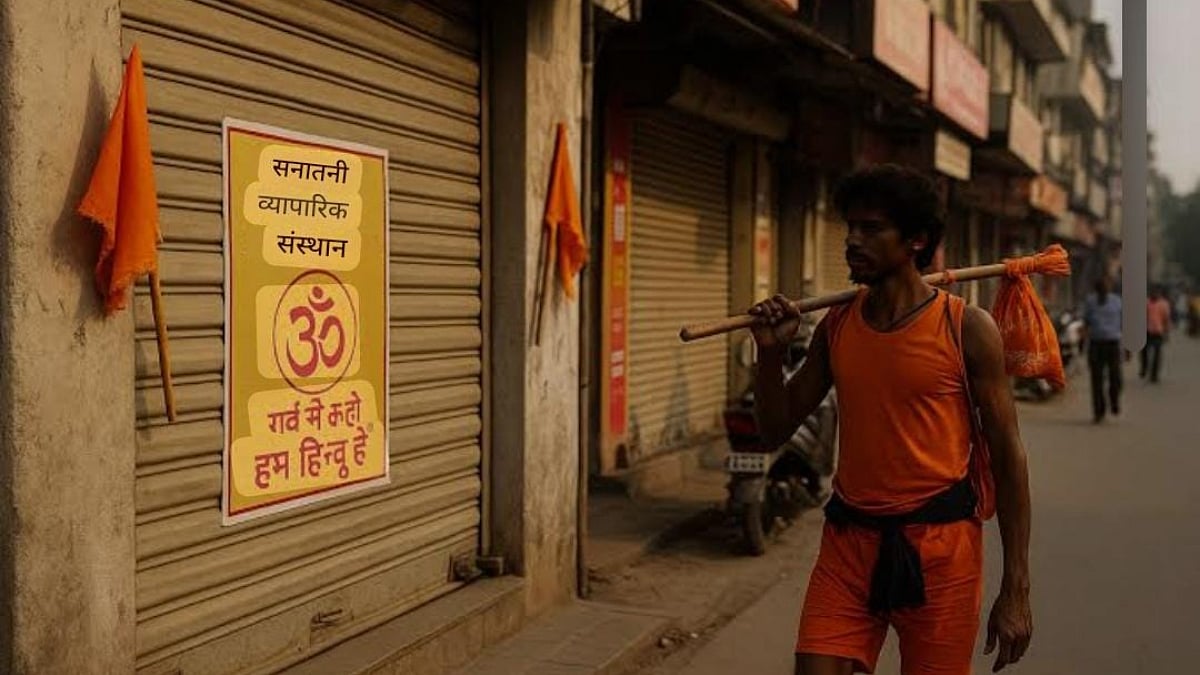Kanwar Yatra Food Guidelines Spark Row: ‘Sanatani’ Stickers, QR Codes Raise Communal And Legal Concerns; VIDEO
A combination of “Sanatani Vyaparik Sansthan” stickers distributed by the Vishwa Hindu Parishad (VHP) and a state-mandated QR code system for eateries has raised fears of religious profiling and economic exclusion, particularly among Muslim traders.

Saffron ‘Sanatani’ stickers and QR codes on eateries along the Kanwar Yatra route have sparked fears of exclusion among Muslim vendors | File Photo
Meerut: Efforts to guide Kanwar Yatra pilgrims toward vegetarian food have triggered controversy along the 540-kilometre pilgrimage route stretching from Delhi through Uttar Pradesh to Uttarakhand.
A combination of “Sanatani Vyaparik Sansthan” stickers distributed by the Vishwa Hindu Parishad (VHP) and a state-mandated QR code system for eateries has raised fears of religious profiling and economic exclusion, particularly among Muslim traders.
The saffron-coloured Sanatani stickers, which bear the message “Garv se kaho, hum Hindu hain” (Say with pride, we are Hindus), are being affixed to food outlets that agree to serve only vegetarian food and abstain from meat and alcohol during the yatra. The VHP says the stickers are meant to help Kanwariyas maintain spiritual discipline during their pilgrimage.
“This is not a campaign against any religion,” said Shachindra Sharma, a senior VHP functionary in Ghaziabad. “Kanwariyas follow strict vows, and the stickers simply guide them to shops that respect those vows.”
However, traders on the ground describe a different reality. Many say they feel compelled to display the sticker or risk losing customers. “No one forced me, but I noticed people wouldn’t enter if I didn’t have the sticker,” said a sweets vendor in Meerut. “They would ask, ‘Is this a Sanatani shop?’ and leave when I said no.”
At the same time, the Uttar Pradesh government has introduced a mandatory QR code system for all food businesses along the route. The code, linked to the Food Safety CONNECT App, reveals the shop owner's name, FSSAI license, hygiene records, and whether the menu is vegetarian or non-vegetarian.
“This is a public health and safety reform,” said Rajesh Kumar, an official in the Food Safety and Drug Administration. “Pilgrims deserve clean, transparent food services. The QR code is about accountability, not religion.”
But critics say the QR codes, when combined with the Sanatani campaign, open the door to informal religious vetting. Muslim vendors in districts like Muzaffarnagar, Bijnor, and Hapur report losing customers after their codes were scanned.
“They don’t say anything,” said Wasim Ali, who runs a small vegetarian dhaba in Bijnor. “They just scan the QR code, see my name, and quietly walk away. My food is pure, but now my name is the problem.”
The matter has reached the Supreme Court, where a petition has been filed challenging the QR code mandate on privacy and discrimination grounds. Advocate Zoya Khan, who is representing the petitioners, argued, “This creates a soft boycott mechanism. No law is being broken, but people are being excluded based on perceived identity.”
The Rashtriya Swayamsevak Sangh (RSS), the VHP’s ideological parent, rejected the allegations. “This is being blown out of proportion,” said RSS pracharak Bholendra. “Devotees want ritual purity. Helping them identify suitable food is not discrimination. Even at home during fasts, people ensure cleanliness and purity — is that communal?”
However, civil rights organisations say they have documented cases of Muslim vendors being discouraged from operating or denied QR code registration. “In many towns, we are hearing that shopkeepers are removing Urdu signboards or avoiding public display during the Yatra,” said activist Sana Javed. “This is exclusion by design, not by law.”
Some traders have reported increased business after adopting the Sanatani label. But others feel alienated. “I had no issue feeding pilgrims. But now I have to prove my identity to be accepted,” said Shabnam Javed, who runs a snack stall in Muzaffarnagar.
Even some Kanwariyas acknowledge the change. “I scan QR codes now before I eat,” said a pilgrim in Haridwar. “If I see a Muslim name, I hesitate. Not because I hate, but because I do not want to break my fast.”
ALSO READ
The VHP maintains that the sticker campaign will end with the yatra season, but legal and civil society groups fear the practice may outlive the festival, permanently altering the social and commercial landscape of India’s towns.
RECENT STORIES
-
-
-
-
-